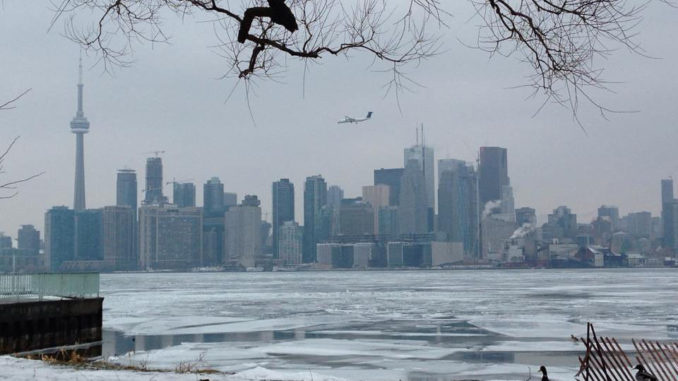
Based on Environment and Climate Change Canada’s forecast, the Office of Emergency Management, in consultation with the Medical Officer of Health, has issued an Extreme Cold Weather Alert (ECWA) today for Toronto in anticipation of the cold weather conditions within the next 24 hours. The ECWA will be in effect until further notice.
ECWAs are issued when the temperature in the daily forecast suggests temperatures will reach approximately -15 degrees Celsius or colder, or when the wind chill is forecast to reach -20 or colder. Other weather-related factors may also be considered when issuing ECWAs.
ECWAs activate local services that focus on getting and keeping vulnerable residents inside. The City activated its Warming Centres on February 7 and they will remain open during the ECWA. Additional Streets to Homes teams who were also activated on February 7 will continue to provide enhanced street outreach response to help support and encourage those living outside to come indoors.
The Warming Centres are located at the following:
o 129 Peter St.
o 5800 Yonge St.
o Exhibition Place, Better Living Centre,195 Princes’ Blvd.
o Scarborough Civic Centre, 150 Borough Dr.
All services at the Warming Centres are delivered following ongoing COVID-19 protocols to ensure the safety of those using the centres. This includes ensuring physical distancing of resting spaces, encouraging physical distancing in all areas of the facility, the mandatory use of masks, ensuring hand washing, conducting symptom screening and monitoring, increasing infection control and prevention measures such as enhanced cleaning, and providing transportation to isolation and recovery sites for individuals that await results or test positive.
The City’s 2020/2021 winter services plan to provide safe indoor spaces and protect people sleeping outdoors from cold weather includes:
• increasing winter capacity from November to April through a combination of shelter and 24-hour respite beds, hotel rooms and housing units with supports to assist people to move indoors from encampments and other outdoor locations
• creating new spaces to operate a 24/7 replacement for the Out of the Cold program
• prioritizing people to move from shelters to new supportive housing units on an expedited basis, including modular housing sites
• operating warming centres during Extreme Cold Weather Alerts
• providing additional 24/7 mobile street outreach during Extreme Cold Weather Alerts to connect with people living outside and encourage them to come indoors
The City asks residents to contact 311 if they see a person experiencing homelessness in need of assistance and the City will dispatch an outreach team to investigate. If the person is in distress or needs immediate assistance, call 911.
To access a shelter, call 311 or Central Intake at 416-338-4766, 1-877-338-3398 toll-free.
Throughout the year, 24-hour respite sites provide meals, places to rest, and service referrals at locations across the city. People can call 311 for locations and to connect to Central Intake for a referral. Homeless Help lists site information at toronto.ca/homelesshelp.
Exposure to cold weather can be harmful to your health. Hypothermia occurs when the body’s core temperature drops below 35 degrees Celsius and can have severe consequences, including organ failure and death. Frostbite can also occur in cold weather when skin freezes and, in severe cases, can lead to amputation when deeper tissues freeze.
Those most at risk of cold-related illness are people experiencing homelessness or those under-housed, those who work outdoors, people with a pre-existing heart condition or respiratory illness, elderly people, infants and young children. People with heart problems can experience worsening of their condition up to several days after cold weather occurs.
During an ECWA, members of the public are encouraged to take the following precautions:
• Check the weather report before going outside.
• Dress in layers, making sure your outer layer is windproof, and cover exposed skin.
• Wear a hat, warm mittens or gloves, and warm boots.
• Stay dry. Your risk of hypothermia is much greater if you are wet.
• Choose wool or synthetic fabrics for your clothes instead of cotton, because cotton absorbs and holds moisture, no longer keeping the wearer warm.
• Seek shelter if you normally spend long periods outside. Depending on the wind chill, exposed skin can freeze in minutes.
• Drink warm fluids other than alcohol.
• Warm up by taking regular breaks in heated buildings when enjoying winter activities outside.
• Consider rescheduling outdoor activities, or limiting time outdoors, during colder temperatures, especially if it’s windy.
• Heat your home to at least 21 degrees Celsius if infants or elderly people are present.
• Call, text or video chat with family, friends and neighbours (especially older adults living alone) to make sure they are keeping warm and not experiencing any difficulties related to the weather.
More information and tips for staying warm during cold weather are available online.
Information to help residents prepare for extreme weather and weatherproof their homes is available at toronto.ca/extremeweatherready
SOURCE City of Toronto

Leave a Reply